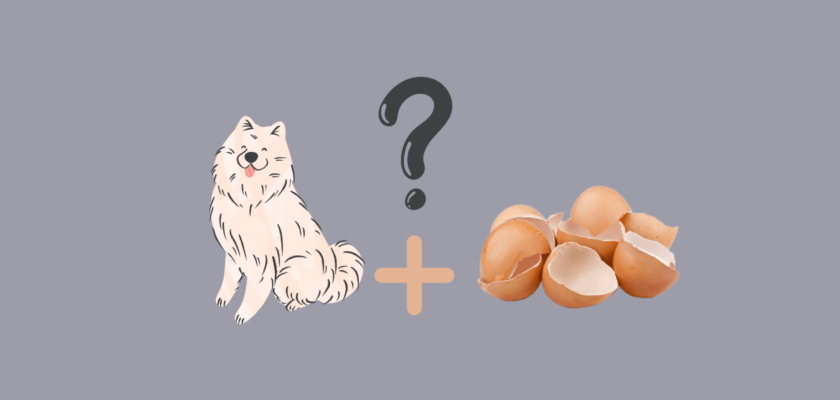Key Takeaways
- In general, eggshells are a safe and healthy addition to a dog’s diet. ✔️
- Raw eggshells can contain salmonella bacteria, which can cause food poisoning in dogs. ⚠️
- Whole egg shells can injure your dog’s mouth and digestive system with their sharp edges. ❌
- Always peel the eggshells from boiled eggs and grind them into a fine powder before serving to your dog. ✔️
First Was the Egg: Are Eggs Good for Dogs?
People have been cooking and eating eggs in various forms for thousands of years – in fact, they’re probably one of the most versatile foods mother nature has to offer. Before we even go on to discuss the possibility of feeding eggshells to dogs, we must ask this first: are eggs good for dogs at all? The short answer is yes.

Eggs can be a great source of many indispensable nutrients, including:
- protein;
- calcium;
- vitamin D;
- calcium;
- phosphorus;
- magnesium;
- selenium.
As such, they can be a part of a balanced diet for dogs. But can dogs eat egg shells? Read on to find out!
Raw Eggs Can Be Bad for Dogs
As good of an ingredient as eggs can be in your dog’s diet, you definitely want to make sure that the egg is appropriately prepared before serving it to your dog. Beware of feeding your dog raw eggs, as they can have bacteria and pose a high risk of food poisoning in your pooch.
Safe ways you can serve eggs to your dog include:
- Hard-boiled: The most common method is to cut hard-boiled eggs into digestible pieces and feed the pieces directly to your dog.
- Scrambled: You can mix them together with dog food for an easy, protein-loaded meal.
- Omelet: These can be tricky, as most omelet recipes contain a bunch of additional ingredients like sugar, spices, mushrooms etc. Just make sure you limit yourself to eggs only, and you’re good!
Cooking eggs thoroughly will get rid of bacteria like salmonella, making them safe for your dog to consume. Whichever of those processed versions you choose, make a point of ensuring that they don’t contain added salt or fats.
Can Dogs Eat Egg Shells, in General?
You now know that eggs themselves are safe, but can dogs eat egg shells? Eggshells seem to be the ultimate eco-friendly gadget everyone has in their kitchen. They prove to have multiple uses in the household, with some people recycling them into mulch or plant fertilizer. Just like the egg itself, the shell is a potent source of calcium and all the other good stuff that can be found in the other parts of the egg.

It’s natural that you may wonder if you can make use of it by adding eggshells to your furry friend’s diet. Can dogs eat egg shells at all? Yes, dogs can eat eggshells, BUT if served in the wrong way, they can actually be life-threatening. Read on to find out more!
Eggcellent Source of Calcium, Protein and More
Here are some benefits of adding eggshells to a canine’s diet:
- Not only do eggshells provide calcium, which can strengthen your dog’s teeth and bones, but they also contain protein in their lining.
- Eggshells can help to absorb liquids, which results in firmer stools.
- They can even serve as a mild appetite stimulant for dogs who suffer from reduced food intake due to dental diseases or other factors.
- Eggshells act as a natural breath freshener by removing bad odors from the mouth.
So what’s the issue with feeding them to your dog? There are two problems, actually.
Don’t Serve Raw Egg Whites or Shells!
Here’s the thing – eggshells can contain salmonella, a type of bacteria that can cause food poisoning. If a dog ingests raw eggshells, they can become very sick. So how to kill any bacteria that may be present on the shells? Simply peel them from boiled eggs and grind them into a fine powder.
Don’t Serve Whole Egg Shells!
Eating too much of the hard mineral calcium carbonate found in eggshells can cause an imbalance for your pup, leading to stomach issues like diarrhea and bloody stool. Protect their health by monitoring how many eggs they’re consuming!
Can dogs eat egg shells? Believe it or not, your pup can actually benefit from adding a little bit of eggshell to their regular dog food – but proceed with caution! It’s important that you grind the shells into a fine powder before serving them up; otherwise they may be too sharp and could cause some harm to your beloved doggo’s tummy.
Safe Ways to Feed Your Dog Eggshells
Spice up your pup’s meal with the perfect topping – eggshells! Add flavor and a nutritional punch to their feed by crushing, beating or mixing whole shells into pieces. Egg beaters and mixers are great tools for creating eggshell powder that can be easily incorporated into food bowls.
Coffee grinders may make grinding faster, but there is potential for clog-ups as beans were made specifically to fit in these machines; opt instead for another appliance when making shell particles small enough to suit Fido’s taste buds!
Nutritious eggshells can be a great addition to your dog’s diet! Commercial products are available in powdered form, so you just have to add the supplement directly into their food bowl for easy digestion and absorption.
Let’s Sum It Up: Can Dogs Eat Eggshells?
Dogs can eat eggshells, but should do so in moderation. Eggshells are full of necessary nutrients and are usually safe for dogs that don’t have egg protein allergies or sensitivities, but they can cause serious stomach upset if not properly ground up.
Pros and Cons of Eggshells for Dogs
| PROS | CONS |
| They’re rich in calcium and protein, meaning they can strengthen a dog’s teeth and bones. | Eggshells can contain salmonella and should not be fed uncooked. |
| Eggshells can soak up moisture in the digestive tract to give firmer stools. | They have sharp edges that could scratch your dog’s digestive system if not ground into a fine powder. |
| They can reduce bad breath odors in the mouth. | Too much of them can cause excess stomach acid and produce diarrhea. |
Similar Posts:
- Can Dogs Eat Raw Eggs? Your Guide to Eggs for Dogs
- Can Cats Eat Eggs? Should You Feed Your Cat Eggs Raw, Boiled, or Scrambled?
- Can Dogs Eat Shrimp? | The Beloved Seafood and Dogs
- Can Dogs Eat Eggs? Are Scrambled Eggs Safe for Dogs?
- Can Dogs Eat Raw Meat? Pros and Cons of Feeding Your Dog Raw Food
- What Human Food Can Dogs Eat? 9 People Foods You Can Give Your Dog
- Can Dogs Eat Raw Chicken? Things to Know Before Feeding Your Dog Raw Meat
- Can Cats Eat Raw Chicken? How Good Is Raw Meat?

